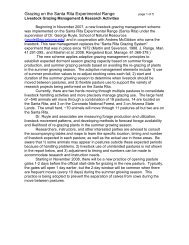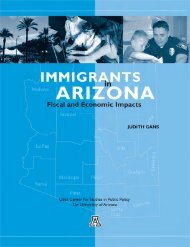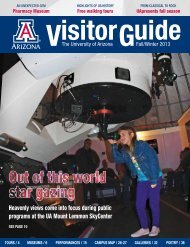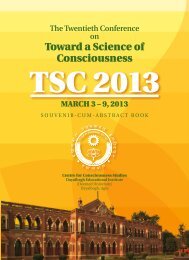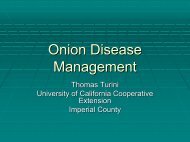CONSCIOUSNESS
Download - Center for Consciousness Studies - University of Arizona
Download - Center for Consciousness Studies - University of Arizona
- No tags were found...
Create successful ePaper yourself
Turn your PDF publications into a flip-book with our unique Google optimized e-Paper software.
6. Culture and the Humanities 223<br />
This is because the locus of control is structurally split between corporate and government<br />
entities in their respective roles of product makers and regulators. The only remaining issues<br />
at this point are to determine the range, depth and locus of regulation to impose including<br />
enforcement protocols. The basis for this view comes specifically from the U.S. Supreme<br />
Court?s 1980 Diamond v. Chakrabarty decision essentially ruling that recombinant genetic<br />
material is patentable and is thus, by extension, property. This does not mean that public or<br />
professional influences are insignificant, but it does mean that evolution has essentiallyl been<br />
corporatized. To clarify one critical point, life forms that exist in nature are not patentable, but<br />
new life forms created by human manipulation of genetic materials that did not previously<br />
exist in nature, are. Thus, we can anticipate and preferably manage not only a wealth of new<br />
medicines and vaccines, a quantum leap in the green revolution, but a rationally regulated<br />
neo-eugenics that focuses on informed individual choice to extend human possibility beyond<br />
the constraints of convention and culture. P12<br />
6.10 Education<br />
343 Building Better Human Beings from the First Flickering of Consciousness.<br />
Activating mastery of art & science of being human - Learning to lift the skirt of<br />
consciousness & take advantage of yourself. Natalie Geld (Los Angeles, CA)<br />
The mind leads - the body follows. Simple, right? Not really. From our first flickering of<br />
consciousness, we are taught what to think, not how to think. Unfortunately, most of us know<br />
more about our iPhone Apps than about what makes us tick. Thoughts and emotions tweak our<br />
chemistry and, in turn profoundly shape our lives. We humans are walking chemistry Labs -<br />
Petri dishes for our own human experiments - quantum possibilities awaiting our observation.<br />
We look at the great minds as being anomalies. They use their minds differently - consciousness<br />
is key. This is our time to begin introducing students to the vital, exciting and challenging<br />
domains of consciousness, of our quantum potentiality. In the 2008 conference, Brack and<br />
Hill noted that most undergraduate and graduate students in the healing sciences “... admit to<br />
distrusting science as any form of guide for working with “real human problems.” And they<br />
proposed: “helping to map human problems onto the domain of Quantum Mechanics, Chaos/<br />
Complexity theory, and Consciousness offers exciting new perspectives on the human experience.”<br />
Great idea - let’s grease their wheels before they reach grad school. Many in general<br />
are science phobic, thinking science is something for what’s ‘out there.’ Generally our chemistry,<br />
biology and physics courses in primary education (perhaps even secondary and beyond,<br />
you tell me) tinker with external forces to reveal process and potentiality; using equations,<br />
beakers, elements, a blowtorch, philosophical discussions, or a frog, cat, pig and scalpel. Our<br />
bodies, our minds are mysterious and fascinating and the perfect ‘tools’ for mastering the art<br />
and science of being human; the practice of which illuminates the resonance of science in our<br />
lives. Supple, fertile minds of youth are eager for the discovery of how to tap and use their<br />
potential, and wither when their studies and experiences don’t make sense for them. There is<br />
opportunity for expanding current curriculum to include an experiential examination of consciousness.<br />
Quality instruction on the science of being human, simplifying our complex mind/<br />
body maps and experimenting with our individual chem labs, will generate improvements for<br />
students across the board - including critical thinking, creativity, self-reliance, innovation and<br />
motivation, as well as building a foundation for free thinking minds. I turn my 10 minutes of<br />
Q&A time toward you, to spark a dialogue and tap into this collective consciousness, this very<br />
dazzling pilgrimage of mastery and ingenuity for ‘how.’ P6



